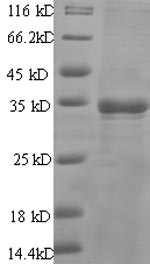This Recombinant Human Prostate Stem Cell Antigen (PSCA) protein is developed to support your cancer research projects. PSCA, a cell surface glycoprotein, is overexpressed in various malignancies, including prostate and pancreatic cancers. As a result, it has emerged as a promising target for cancer diagnostics and therapy development.
Our Recombinant Human PSCA protein is expressed in E. coli, ensuring a reliable and efficient production process. The protein features the full-length mature sequence (12-86aa) and is fused with an N-terminal GST-tag for easy purification and detection. With a purity of greater than 90% as determined by SDS-PAGE, you can expect consistent performance in your experiments. Available in both liquid and lyophilized powder forms, our Recombinant Human PSCA protein is designed to meet the diverse needs of your cancer research endeavors.






